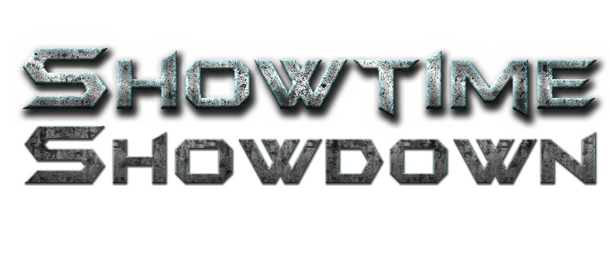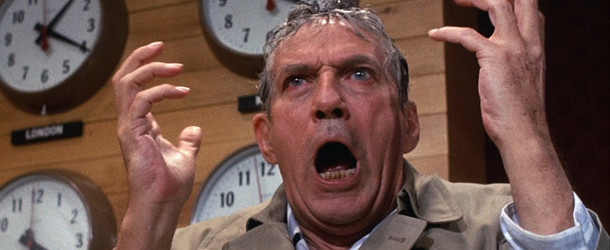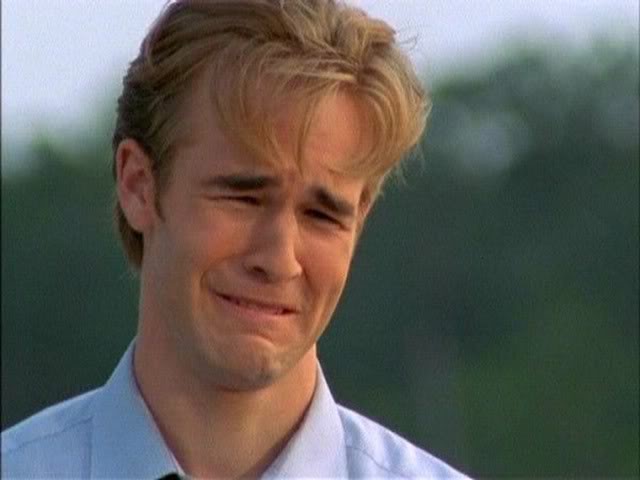I have a love-hate relationship with ‘70s movies. Times were changing. Vietnam soldiers returned home, the civil rights movement died down, Nixon resigned as president, and television officially replaced radios. No one knew where the country was headed. It’s during this time that Hollywood began to develop a social conscience. Movies became a reflection of the country’s political and social paradigm shifts. But, of course, that’s not always a good thing. While classics like The Deer Hunter or The French Connection touched base on socio-political issues with appropriate pathos and without talking down to its audience, other movies served only to preach their message in the guise of a story. Network, as revered as it is, is nothing more than a manipulative, didactic drama that exists to do nothing but condemn television and its viewers.
This movie is allegedly one of the finest films ever made, with one of the best screenplays ever written. It won a slew of academy awards for its cast as well as its screenwriter. My hopes were high when the beginning credits rolled. After just a few scenes, however, it was clear that screenwriter Paddy Chayefsky and director Sydney Lumat suffered from an obsession with their quest to let the audience know how corrupt and degenerative television is.
In this fictional world, UBC acts as a fourth major network (in the days before Fox), aiming to make a name for itself in the national television ratings. One evening, after discovering he’ll be fired, Howard Beale (played by Peter Finch) announces on-air that he is going to commit suicide on his last taping. Somehow, this proves to be an effective stunt and a newly revitalized The Howard Beale Show, show becomes a roaring success, reaching the top spot in the ratings.
Behind the scenes, Faye Dunaway plays UBC’s heartless, double-crossing Vice President of Programming, Diane Christensen, who is responsible for turning the evening news into a soapbox platform for Beale to give God-given lectures. William Holden plays the News Division President, Max Schumacher, and also the lifelong best friend of Howard Beale—and also newfound lover of Diane. There’s also Robert Duvall’s Frank Hackett, who runs the station and reports to the board of directors.
That’s pretty much it. There are a couple firings that are retracted then restated, but this isn’t much of a plot-driven movie. And why would it be? Its message is clear: television producers are corrupt and television viewers are stupid. Some claim this movie to be a comedy or a satire, but it’s far too mean-spirited to be either. It seems like this long-winded soap opera was conceived around this bloated moral.
Essentially, the movie is all dialogue. Every character has their tedious speeches that earned the actors their awards—and that’s the problem. There’s a lot of chitchat going on and not a lot of things actually happening. And when they finally do, the characters talk about their actions as they are doing them. For instance, when Schumacher leaves his wife for Diane, “I guess I’m the husband who ends up something and blah blah blah…” Basically, they are acknowledging how cliché it all is. If they can declare themselves to be archetypes, they’re pretty much acknowledging the clear lack of originality. Which perhaps is the point, but that doesn’t mean it makes for a pleasurable viewing experience. It’s torture.
Most of the orations are delivered by Beale while on his show, where he acts like a lunatic televangelist preaching to his audience. Another problem that exists within this movie is that these lectures and occurrences are far too dated. The featured show Ms. Christensen creates, involving a behind-the-scenes look at an underground terrorist group would be declared as nothing more than a petty reality show today. Other major networks have since been developed (not to mention cable), and the zeitgeist this movie represents doesn’t translate into our computer-driven society, leaving Beale’s self-important discourses inapt. It would be an interesting window of history, though, if the filmmakers didn’t decide to demonize the world of television to such extremities.
Since this is only one of two movies to win three Oscars for acting, let’s talk about the performances and the characters. First: Beatrice Straight. This win has me confused. How was this woman even nominated? Sure, she’s good in it, for the whopping five minutes of screen time she has. She’s basically only the driving force in one scene and silent the rest of the two scenes in which she’s seen. Straight beat out tough completion that year for Best Supporting Actress; perhaps the other actresses split the votes, allowing for Straight to pull ahead. Her role so damned short and unimportant to a movie centered on television production. I can’t say enough about how stupid this win is.
Then there’s Peter Finch, who passed away before he could accept his Oscar in 1977. Yeah, he’s good, and he convincingly delivers one of the most famous lines in cinema well: “I’m as mad as hell and I’m not going to take this anymore.” He speaks as though getting the news from television is somehow less honorable than learning it through the newspaper. It’s supposed to be an annoying character, and boy is it. So Finch, decidedly, did his job.
Faye Dunaway, playing one of the world’s most mammoth bitches I’ve ever seen, gives her all in this Mephistophelean, pitch-perfect performance. She lies. She’s manipulative. She’s wrecks happy homes. She even helps orchestrate killings. And she does so without apology. She’s only interested in TV and her career, honing in on her prey with that slight squint in her eye. Her work is her life, even more so than her awkward and uncomfortable relationship with Holden—who by the way seems to deliver each line with the same inflection as the one before. I’ve never cared much for the way Holden interprets dialogue. He’s too predictable and methodical.
Also, it’s hard to understand how this movie won the best screenplay award in 1977. I guess it’s only real major competition was Rocky. To me, this script is an unabridged mess. I don’t think any consideration was taken for where each character was going. It’s all too obvious that the filmmakers are trying to prove how disgusting the world of television is, but it fails to do so effectively because it leaves people to damned bored from hearing monologue after monologue. Even Shakespeare would have plugged his ears.
Great movies are timeless. Oscars are often handed out with little insight with how movies will be regarded in the future. As a result, films like Network are crowned classics when in today’s viewing they appear dated and flimsy. If you enjoy being lectured about how mundane you are, by a bunch of boorish, self-serving sons-of-bitches, you’ll enjoy this movie. Personally, I hated (and I don’t often hate movies) this movie and consider it to be nothing but overrated nonsense.








